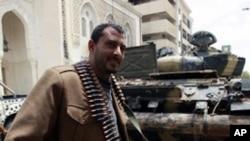While NATO has been using air power to attack the forces of Libyan leader Moammar Gadhafi, some analysts suggest arming the Libyan rebels. But others say it’s a bad idea that could have negative consequences.
Many experts say that without the help of fighter planes and missile strikes from NATO members, the ill-equipped and poorly trained Libyan rebel force would have been defeated by now or be on the verge of defeat. Some analysts say the international coalition has become in essence, the rebels’ air force.
But many military experts say air power alone will not defeat the Gadhafi forces. Some are advocating providing the Libyan opposition with more sophisticated weaponry such as heavy artillery, tanks, rocket systems and armored vehicles.
Paul Smyth served in the British Royal Air Force with a squadron that enforced the no-fly zone over southern Iraq in the 1990s. He is opposed to providing weapons to the Libyan rebels for several reasons. First of all, he says it could create political difficulties within the NATO-led coalition and bring about unnecessary friction between allies.
"Secondly, once the weapons have been delivered to the rebels, the coalition will have no control over how they are used. You would then perhaps be faced with the difficulty that would follow weapons being fired by the rebels into say an urban area killing civilians - and the very mandate that NATO is operating under, which is to protect civilians, would be significantly undermined as NATO provided weapons that were responsible for the death of civilians," he said.
Thirdly, says Smyth, there is a chance that weapons delivered to the Libyan rebels may ultimately find their way to other regions, such as Afghanistan.
That view is echoed by John Bolton, former U.S. ambassador to the United Nations. "I would not arm the Libyan opposition at this point because I don’t think we know enough about them. I don’t think we know where the weapons might ultimately end up. I think the better way to deal with the situation in Libya and it would have been better dealt with right at the very beginning, is to target Gadhafi’s top echelon and try to shatter the regime," Bolton said.
But that, experts say, would mean officially endorsing what is known as "regime change" - something the international coalition has not yet done. However, U.S. President Barack Obama and other Western leaders - including French President Nicolas Sarkozy and British Prime Minister David Cameron - have made clear that Colonel Gadhafi must go. Some analysts say that is tantamount to the goal of regime change.
As politicians and experts debate whether to arm the Libyan rebels, Paul Rogers from Bradford University in Britain says doing so would escalate the conflict and may not bring about the West’s desired result.
"So I am not at all sure that the regime, given that it has survived nearly two months, including one month of air power from NATO, I’m not at all sure that the regime would actually collapse. So I think the circumstances we are now in, if you have a major arming of one side, a direct involvement in a civil war, that may actually make matters worse in Libya - and certainly make matters worse across the region as a whole," Rogers said.
Some experts say the only way to defeat Colonel Gadhafi’s army is for western nations to provide ground troops to fight alongside the rebel forces. But Rogers is against such a move.
"It is almost impossible to see there would be an approved United Nations Security Council resolution along those lines, because Russia and China would almost certainly veto it. For NATO to go into yet another Arab country without a full U.N. mandate would be, I think, potentially very disastrous from their point of view," Rogers said.
As for the military stalemate in Libya, Rogers and others say it could go on for a long time unless the Gadhafi government collapses as a result of internal dissension. But many experts say that is quite unlikely in the near future.
Analysts Say Arming Libyan Rebels Could Have Negative Consequences




